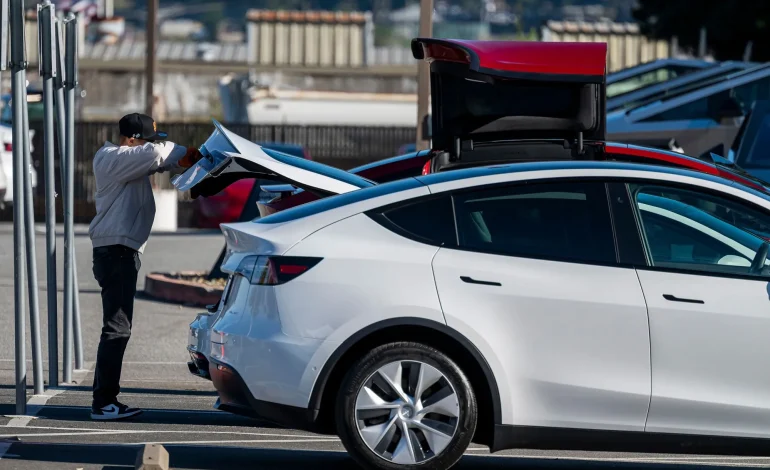President-elect Donald Trump’s threat to eliminate tax credits for electric vehicles (EVs) appears to have triggered a late-year surge in EV sales, providing a much-needed boost after a somewhat disappointing year for the sector, Bloomberg reports.
This surge contributed to a broader rise in overall auto sales as 2024 came to a close.
According to forecasts from Cox Automotive, EV sales grew by 12% in the fourth quarter of 2024, pushing the full-year total to a record 1.3 million units. This growth marks a significant acceleration from the 8% growth rate observed in the previous quarter. While plug-in models now constitute roughly 8% of the total US car market, this figure represents only a modest increase from the previous year.
The strong fourth quarter also contributed to a rise in overall car sales, with the annualized rate for 2024 reaching 15.9 million cars, up from 15.5 million the year before. This increase is attributed to a combination of lower interest rates, increased manufacturer incentives, and reduced anxiety around the presidential election.
However, the EV surge is not expected to continue into 2025. The election results have encouraged buyers who were waiting for deals to make purchases before potential policy changes under Trump make electric vehicles more expensive. Currently, only 25% of new car shoppers are considering an EV for their next purchase, a two-percentage-point decrease from the previous year, according to JD Power.
Trump made repealing federal policies intended to boost EV sales a central part of his campaign, criticizing what he termed President Joe Biden’s “insane electric vehicle mandate.” Advisers to his transition team have recommended eliminating the $7,500 tax credit for plug-in vehicles. He has also threatened tariffs on Canada and Mexico, both key players in the US auto supply chain, which could further increase car prices.
Earlier in the year, inflation and a cyberattack on car dealerships had clouded the sales outlook for 2024. However, the positive end-of-year performance has prompted analysts to raise their full-year sales forecasts.
General Motors Co. is expected to be the largest automaker in the US by sales for 2024, delivering 2.7 million vehicles, followed by Toyota Motor Corp., Ford Motor Co., Hyundai Motor Co., and Honda Motor Co., according to Cox. Stellantis NV, which has struggled with product launch delays and bloated inventories, is expected to fall to sixth place with a 15% drop in deliveries.
While Tesla Inc. remains the EV sales leader by a significant margin, the company experienced its first annual sales drop in over a decade last year, despite record fourth-quarter deliveries. Meanwhile, electric compact and mid-size SUVs from GM, Honda, Hyundai, and Kia attracted more shoppers in December, according to JD Power.
Affordability continues to be a significant barrier, keeping car sales below pre-pandemic levels. The average retail transaction price for new vehicles is approaching $46,258, according to JD Power. For EVs, high costs are the primary deterrent for potential buyers, followed by an insufficient charging infrastructure.
With the current tax credit, EV buyers receive an average rebate of $5,600 per car, JD Power figures show. Economists predict demand could plunge by as much as 27% without such incentives.
In response to potential policy changes, some automakers, such as GM and Hyundai, have pledged to continue their EV offerings, while others have delayed EV plans to prioritize hybrids, which experienced strong growth in 2024. Stellantis has delayed its all-electric Ram launch, while Hyundai will double its hybrid lineup, and Ford has pledged to offer hybrid versions of all its models by 2030.








